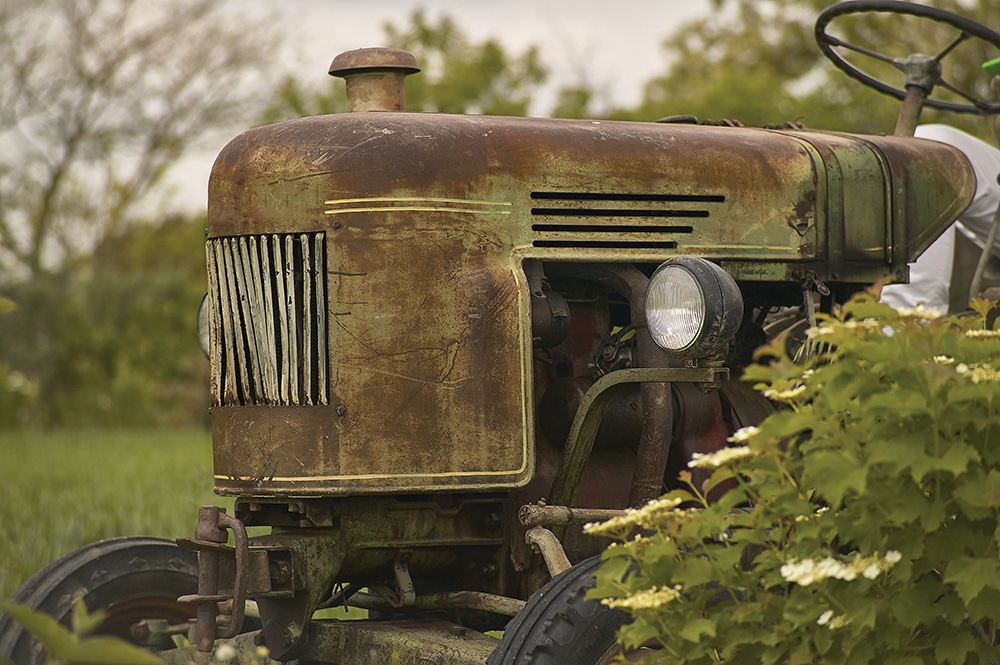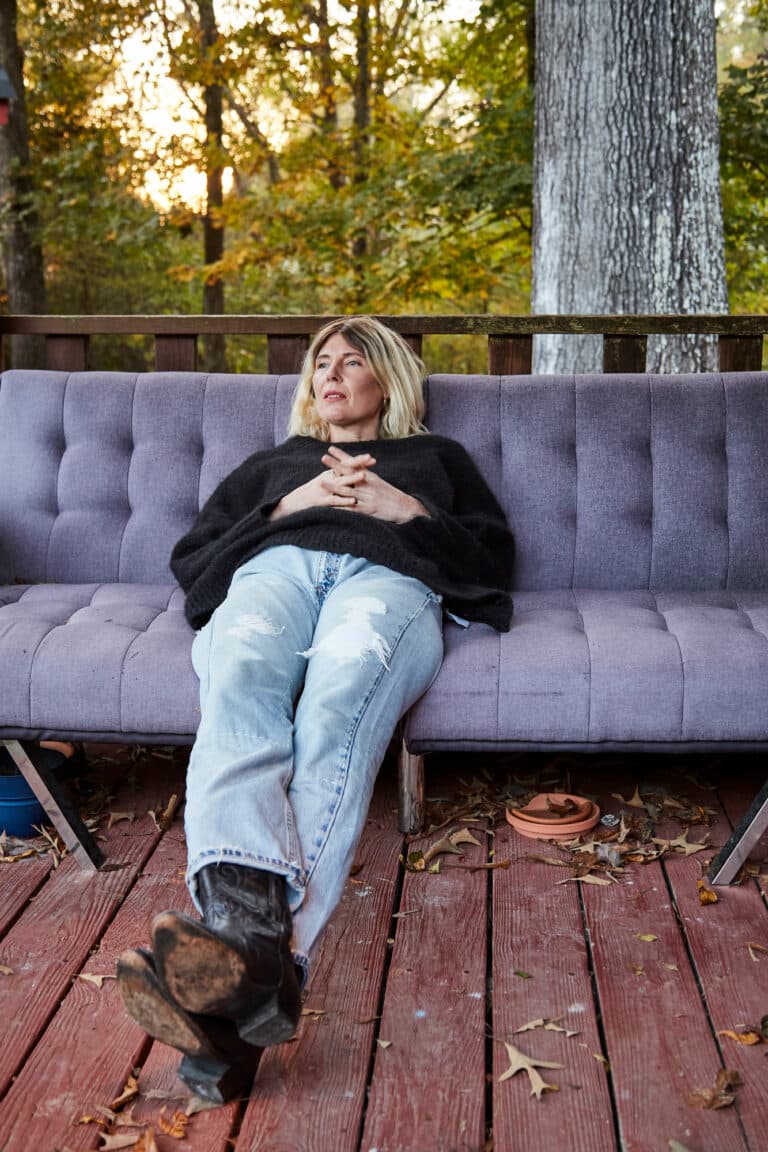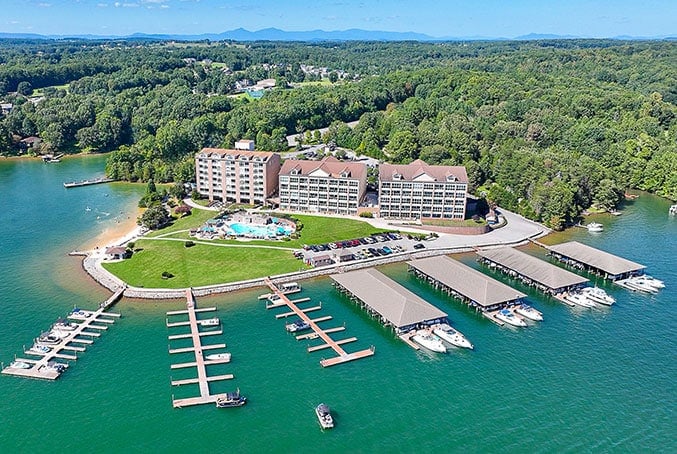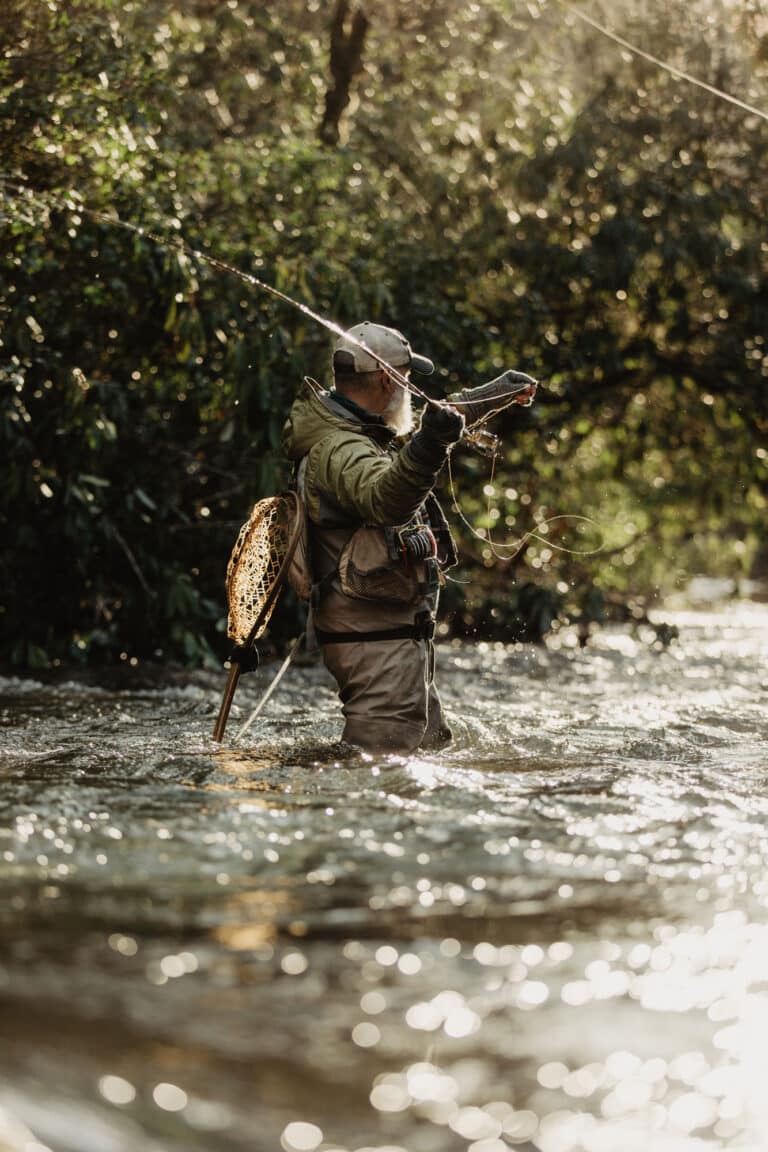He wears overalls and collects scrap metal—and knows more about the forest than any adrenaline junkie driving past
Danny Barnett lives next to a one-lane bridge at the entrance to Pisgah National Forest, where each day, SUVs loaded with bikes and boats drive by. He waves at each one that passes.
Danny looks after the one-lane bridge, weedeating alongside it in the summer, filling potholes in the winter. Usually, though, Danny is working in his junkyard, littered with broken washing machines and rusted tractor parts.
For years, I had driven by Danny’s junkyard on my way to the trailhead. Eager to get to the forest for my ride or run, I zipped past Danny, windows down, tunes blasting. Sometimes I forgot to wave back.
Then a few years ago, Danny was fishing from the bridge, and I rolled down my window to chat. It turned out that Danny knew more about the forest than anyone motoring past.
I have stopped to talk with Danny many times since. Danny is a church-going Baptist who wears overalls and is missing a few teeth, yet he is one of the most accomplished outdoor explorers I know. He knows every holler and creek in the mountains that surround his homestead.
Danny has been roaming the forest since he was five. He knows where to find secluded fishing holes better than any guide, and he can hike steeper and deeper into the mountains than most backpackers. He bushwhacks across ridgelines to find an old stand of chestnuts or a patch of ginseng, reading the cartography with his eyes and memory rather than with a map or GPS.
Danny has spent his whole life in these mountains. He grows most of his own food using heirloom seeds that his family and neighbors have passed down for generations. Most of his food is grown organically, although he doesn’t call it that.
Danny is not a tree hugger; in fact, he cuts them down regularly. Nor is he a vegetarian. He doesn’t belong to any environmental group. He’s never seen Forks Over Knives or any eco-documentaries by Leonardo DiCaprio, though he knows a lot about climate and where his food comes from.
He slaughters and butchers his own meat. He heats his house with wood selectively harvested from the forest. Though he has never heard of permaculture, he knows how to use what’s available: manure from his cows fertilizes the gardens; ash from his woodstove is used to make soap; rocks from the fields become a dry-stacked stone wall.
For decades, he has been meticulously sorting through discarded appliances and reselling scrap metal. He repurposes and repairs, and in so doing, goes way beyond the most militant recycler.
Unlike some well-intentioned environmentalists who buy carbon offsets and renewable energy credits to continue buying and doing everything they want, Danny has lived simply, sustainably, and self-sufficiently his entire life.
Living simply doesn’t mean living easily. The simple life means dawn-to-dusk days of backbreaking labor: hauling manure, splitting firewood, digging fencepost holes. It means eating only what’s in season, which can seem dull and repetitive to our supermarket stomachs. It means staying put.
His carbon footprint is negligible. He doesn’t buy much. He fixes everything himself. He doesn’t travel. He is content to spend his days on the farm or in the forest.
“I don’t need to go anywhere,” he says. ”There’s no other place I’d rather be.”
There are probably others like Danny in these hills. They don’t call themselves eco-anything, but they are greener than most environmentalists. They’re not members of nonprofits, but they give all of their surplus harvest to neighbors in need. They’re not living in a commune or eco-village, but they are bartering food, labor, and skills in their own self-sustaining community economy.
On my way to the nearest trail or river, I have probably driven by many old-timers like Danny who know and love the forest even more deeply than I do. It’s just that I rarely take the time to stop and listen.
I don’t want to be just an adrenaline-fueled adventurist parachuting in to my favorite forest. I want to know the land as deeply and intimately as Danny does. I still have a lot to learn about what I need—and what I don’t.
The trailhead is often filled with clean-shaven suburbanites wearing sunglasses and Spandex, their roof racks loaded with the latest gear. Danny walks into the forest with only a water bottle and some fishing hooks, but he can hike and camp for days—gathering wild edibles and catching trout. He can name every species of tree in the forest and identify an animal by its tracks, but he never once read a guidebook.
“I just pay attention is all,” Danny says.
We mountain bikers and trail runners may know a few narrow ribbons of trail through the forest, but usually we are blasting across the terrain, checking our Strava splits along the way. We rarely take the time to explore the forest beyond the well-groomed paths, where bears and old trees take refuge.
Danny is a lot like the bridge he fishes from. He straddles the junkyard and the wilderness. He connects the city slickers driving past to the rural folk that have looked after the forest for generations. He waves at everyone who drives by, no matter who they are or where they come from. He accepts anyone’s junk. On our way to the pristine forest, he deals with the clutter we seek to leave behind.
At age 76, Danny has debilitating arthritis from decades of manual labor. He once rolled a tractor on top of himself and permanently injured his back. He lost two fingers from his right hand in a logging accident.
Danny feels the changing seasons in his bones, he told me on my last visit. His wife is battling cancer. Nearly all of his kin have passed. “Life goes by,” he said. “We’re only here a few days and then we’re gone.”
Cover photo courtesy Getty Images








